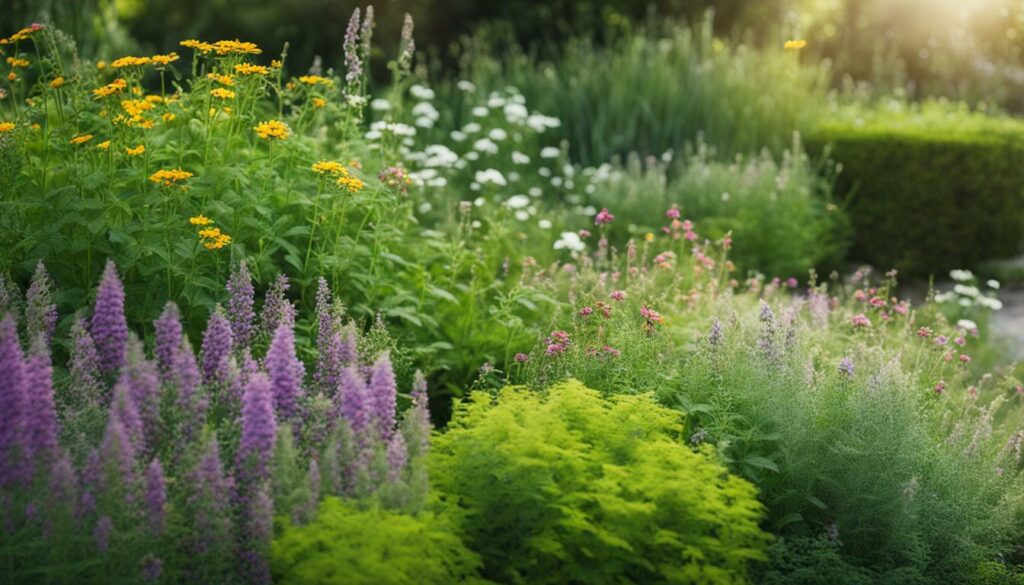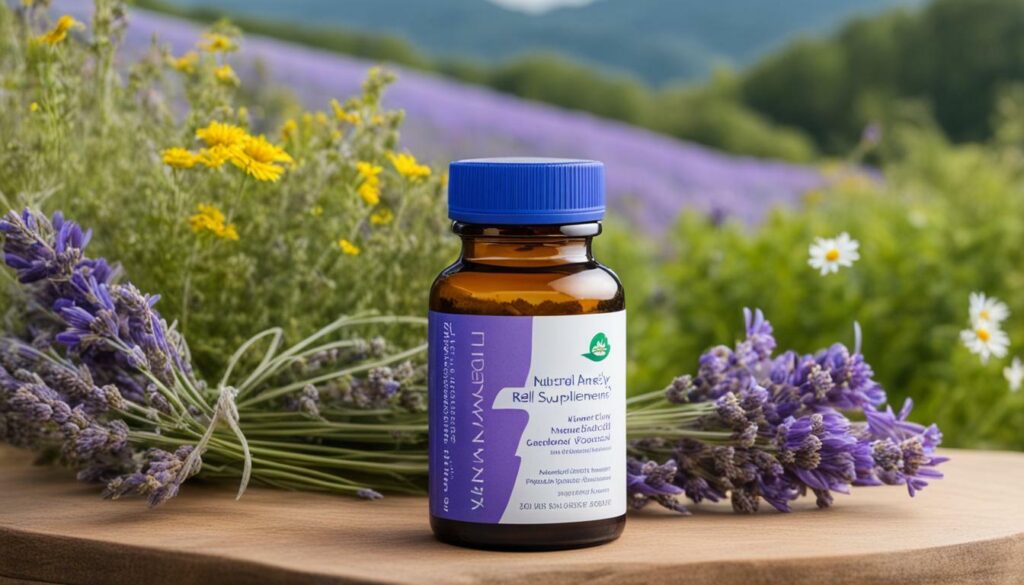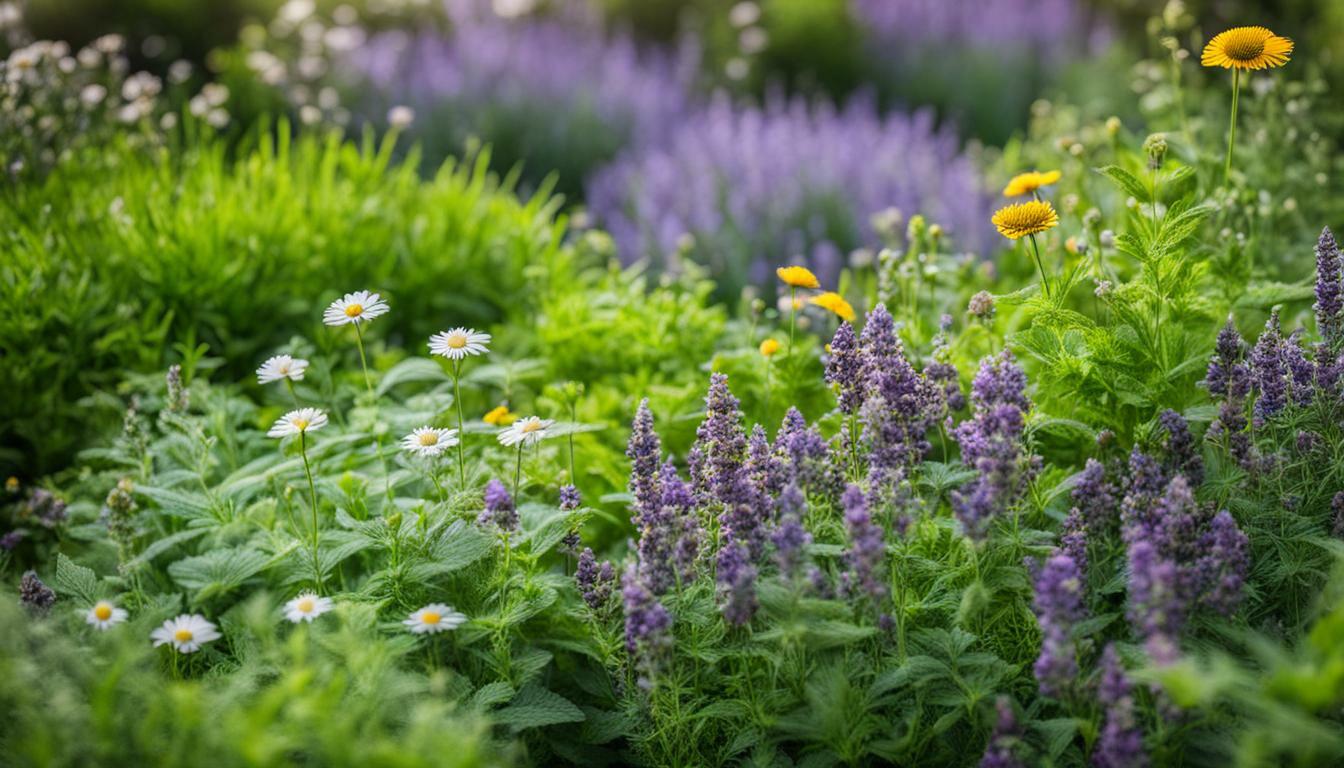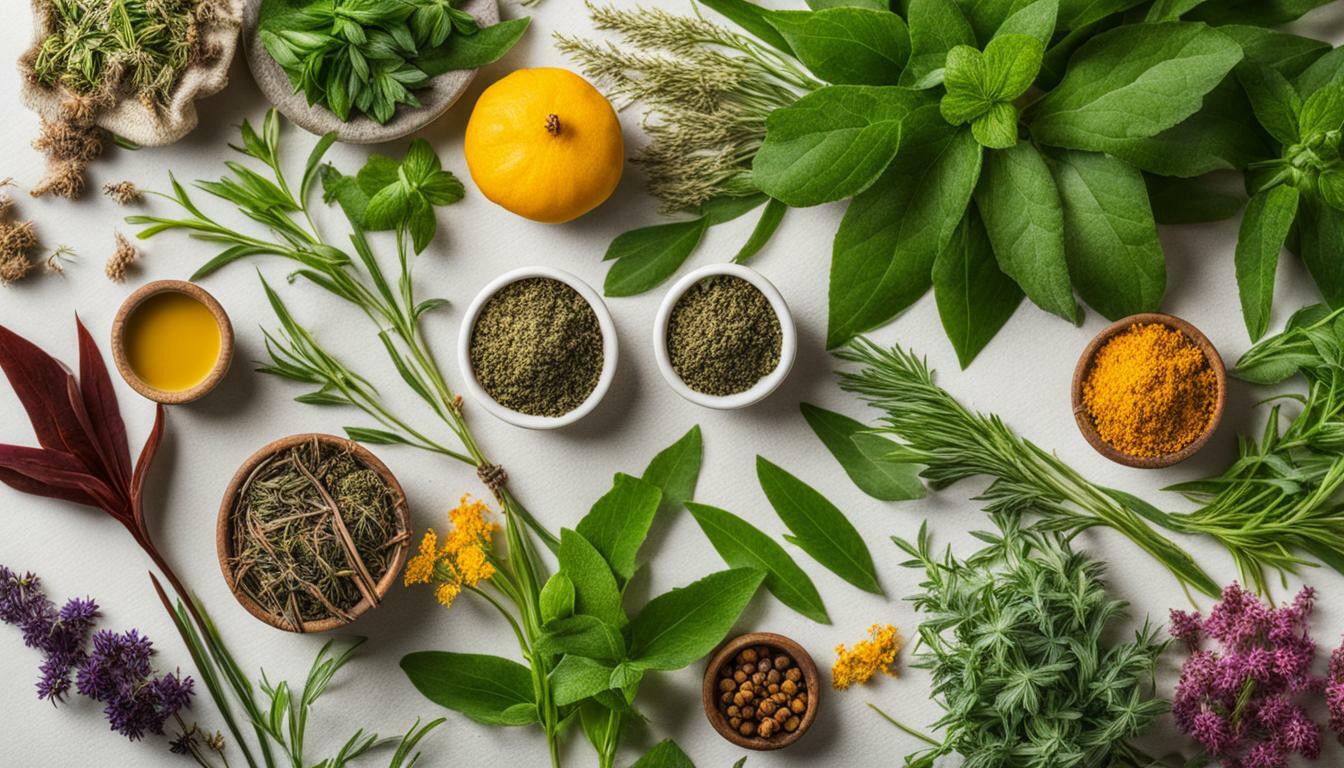Are you looking for a natural solution to relieve anxiety? Look no further than herbal medicine. In this section, we will explore the power of herbal medicine in providing natural relief for anxiety. We will discuss various herbal remedies that have shown promise in reducing stress and anxiety levels.
- Several herbal remedies have shown promise in relieving anxiety.
- Herbs such as kava, passion flower, valerian, chamomile, lavender, lemon balm, and ashwagandha have been studied for their anxiety-relieving properties.
- It’s important to note that herbal supplements are not regulated by the FDA, so quality and safety can vary.
- Consult with a healthcare professional before starting any herbal supplement, especially if you are taking other medications.
- If your anxiety is severe or interfering with your daily life, medical treatment or therapy may be necessary.
The Benefits of Herbal Medicine for Anxiety
Herbal medicine offers a range of benefits for individuals seeking relief from anxiety. Several herbal remedies have shown promise in reducing anxiety symptoms and promoting a sense of calm and relaxation. While more research is needed to fully understand the risks and benefits of these herbs, they have been used for centuries in traditional medicine and are worth considering as a complementary approach to anxiety management.
One herb that has gained attention for its anxiety-relieving properties is kava. Kava has been used in the South Pacific for centuries to promote relaxation and reduce anxiety. Research suggests that kava may work by increasing levels of gamma-aminobutyric acid (GABA) in the brain, a neurotransmitter that helps regulate anxiety. However, it’s important to note that the long-term use of kava has been associated with liver toxicity, so it should be used with caution and under the guidance of a healthcare professional.
“Several herbal remedies have shown promise in reducing anxiety symptoms and promoting a sense of calm and relaxation.”
- Passion flower is another herb that has been studied for its anxiety-relieving effects. It is believed to work by increasing the levels of gamma-aminobutyric acid (GABA) in the brain, similar to kava.
- Valerian root is known for its sedative properties and has been used for centuries to promote relaxation and improve sleep. It may help reduce anxiety, although more research is needed to confirm its effectiveness.
- Chamomile is a soothing herb that has been used for centuries to calm the nerves and promote relaxation. It may help reduce anxiety symptoms, although the research is limited.
It’s important to note that herbal supplements are not regulated by the FDA, so the quality and safety can vary. It’s always best to consult with a doctor or qualified healthcare professional before starting any herbal supplement, especially if you are taking other medications. They can provide guidance on dosage, potential interactions, and monitor your progress to ensure the treatment is safe and effective for you.
If your anxiety is severe or interfering with your daily life, medical treatment or therapy may be necessary. Herbal remedies can be used in conjunction with traditional treatments to provide a comprehensive approach to anxiety management. The key is to work with a healthcare professional to determine the best course of action for your individual needs.
Table: Herbal Remedies for Anxiety
| Herb | Properties | Potential Benefits |
|---|---|---|
| Kava | Relaxant, anxiolytic | Reduces anxiety symptoms |
| Passion Flower | Relaxant, sedative | Increases GABA levels, reduces anxiety |
| Valerian Root | Sedative | Promotes relaxation, may reduce anxiety |
| Chamomile | Soothing | Calms the nerves, promotes relaxation |
Remember, herbal medicine can be a valuable tool in managing anxiety, but it’s important to approach it with caution and seek professional guidance. By combining the benefits of herbal remedies with medical treatment and therapy, you can create a personalized and effective approach to reducing anxiety and improving your overall well-being.

Discover the power of nature’s remedies – these herbal options may provide the relief you seek. When it comes to managing anxiety, many people turn to herbal remedies as a natural alternative to traditional medications. While more research is needed to fully understand their effectiveness, several herbs have shown promise in reducing anxiety symptoms.
“I have found great comfort in using herbal remedies to ease my anxiety. Incorporating these natural options into my daily routine has made a significant difference in my overall well-being.”
One herb that has gained attention for its anxiety-relieving properties is kava. Kava has been used for centuries in traditional medicine as a calming agent and has been found to potentially reduce anxiety levels. However, it’s important to note that long-term use or high doses of kava may have adverse effects on the liver, so it should be used with caution and under the guidance of a healthcare professional.
Passion flower is another herb that has been studied for its potential to alleviate anxiety. It is believed to work by increasing levels of gamma-aminobutyric acid (GABA) in the brain, which helps regulate anxiety. While more research is needed, initial studies have shown promising results in reducing anxiety symptoms.
Valerian, chamomile, lavender, lemon balm, and ashwagandha are other herbal remedies that have been traditionally used for their calming properties. These herbs may help promote relaxation and reduce stress and anxiety levels. Incorporating them into a holistic approach to anxiety management, alongside lifestyle changes and therapy, may provide additional support.

| Herb | Potential Benefits |
|---|---|
| Kava | May help reduce anxiety levels |
| Passion Flower | Promotes relaxation and may reduce anxiety |
| Valerian | May alleviate anxiety symptoms |
| Chamomile | Promotes relaxation and may reduce anxiety |
| Lavender | May help reduce stress and anxiety levels |
| Lemon Balm | May have calming effects and reduce anxiety |
| Ashwagandha | May help reduce stress and anxiety levels |
Consult a healthcare professional before using herbal remedies for anxiety
It’s important to note that herbal supplements are not regulated by the FDA, so quality and safety can vary. Therefore, it’s crucial to consult with a healthcare professional, such as a doctor or herbalist, before incorporating any herbal remedies into your routine, especially if you are taking other medications or have pre-existing health conditions.
While herbal remedies may provide relief for mild to moderate anxiety, if your symptoms are severe or interfering with your daily life, it is recommended to seek medical treatment or therapy for a more comprehensive approach to managing anxiety.
Understanding the Safety and Quality of Herbal Supplements
While herbal supplements can be beneficial for anxiety, it’s crucial to understand the safety and quality aspects before incorporating them into your routine. Several herbal remedies, such as kava, passion flower, valerian, chamomile, lavender, lemon balm, and ashwagandha, have shown promise in reducing anxiety symptoms. However, it’s important to note that herbal supplements are not regulated by the FDA, meaning that their quality and safety can vary.
Before starting any herbal supplement, especially if you are taking other medications, it’s always best to consult with your doctor. They can provide personalized guidance based on your specific health needs and potential interactions with other treatments. Your doctor can also help identify any underlying causes of your anxiety and determine if medical treatment or therapy may be necessary.
To ensure the safety and efficacy of herbal supplements, it’s important to choose reputable brands that prioritize quality control. Look for products that are independently tested by third-party laboratories to verify their potency and purity. Additionally, check for certifications such as Good Manufacturing Practices (GMP) to ensure that the supplements are manufactured in a regulated and safe environment.
| Considerations for Choosing Herbal Supplements | Benefits | Precautions |
|---|---|---|
| Consult with a healthcare professional | – Personalized guidance – Potential interactions |
– Medication conflicts – Underlying health conditions |
| Choose reputable brands | – Quality control – Independent testing |
– Avoid counterfeit products – Unknown ingredients |
| Look for certifications | – GMP compliant – Regulated manufacturing |
– Lack of industry standards – Inconsistent product quality |
Remember, herbal supplements should not replace professional medical advice or prescribed treatments. They can be used as complementary tools in managing anxiety, but it’s essential to have a comprehensive approach that includes proper healthcare guidance. By understanding the safety and quality considerations of herbal supplements and working closely with your healthcare team, you can make informed choices that support your overall well-being.

Herbal medicine can be a valuable addition to your anxiety treatment plan when used in conjunction with medical interventions. While medical treatments such as therapy and medications play a crucial role in managing anxiety, incorporating herbal remedies can provide additional support and promote overall well-being.
Several herbal remedies have shown promise in relieving anxiety symptoms. For example, studies have suggested that herbs like kava, passion flower, valerian, chamomile, lavender, lemon balm, and ashwagandha may help reduce anxiety levels and promote relaxation. However, it’s important to note that more research is needed to fully understand the risks and benefits of these herbs.
When considering herbal supplements for anxiety, it’s essential to consult with a healthcare professional. They can assess your individual needs, consider any potential interactions with medications you may be taking, and provide guidance on appropriate dosage and usage. This is particularly important as herbal supplements are not regulated by the FDA, meaning there can be variations in quality and safety.
It’s worth mentioning that herbal medicine should not replace medical treatments for severe anxiety or those that significantly impact daily life. In these cases, it is crucial to work closely with a healthcare professional to determine the most appropriate course of action. They can help develop a comprehensive treatment plan that incorporates both medical interventions and herbal remedies, ensuring the best possible outcomes for anxiety management.

| Herb | Potential Benefits |
|---|---|
| Kava | May help reduce anxiety and promote relaxation |
| Passion Flower | Could potentially alleviate anxiety symptoms |
| Valerian | May have a calming effect and aid in sleep |
| Chamomile | Known for its calming properties and potential anxiety relief |
| Lavender | May help reduce stress and promote relaxation |
| Lemon Balm | Thought to have soothing effects and aid in relaxation |
| Ashwagandha | May help reduce stress and anxiety levels |
Remember, every individual’s experience with herbal remedies may vary, and what works for one person may not work for another. It’s essential to listen to your body and work closely with a healthcare professional to find the right balance of medical and herbal treatments for your anxiety management.
Conclusion
Herbal medicine offers a natural and potentially effective option for managing anxiety, but it’s essential to approach it with informed decision-making and the guidance of a healthcare professional. While several herbal remedies, including kava, passion flower, valerian, chamomile, lavender, lemon balm, and ashwagandha, have shown promise in relieving anxiety symptoms, further research is needed to fully understand their risks and benefits.
It’s important to note that herbal supplements are not regulated by the FDA, meaning that the quality and safety of these products can vary. Therefore, it’s always best to consult with a doctor before starting any herbal supplement, especially if you are taking other medications. Your healthcare professional can provide personalized advice and help you make informed decisions based on your specific needs and medical history.
If your anxiety is severe or interfering with your daily life, medical treatment or therapy may be necessary. While herbal remedies can complement traditional treatments, they should not replace professional help. Seeking the guidance of a healthcare professional ensures that you receive comprehensive care and appropriate treatment options tailored to your unique situation.
Ultimately, managing anxiety requires a holistic approach that takes into account various factors, including lifestyle, stress management, and mental health support. By incorporating herbal medicine under the guidance of a healthcare professional, you can explore natural remedies alongside other recommended treatments to find a personalized plan that works best for you.
FAQ
Are herbal remedies effective in treating anxiety?
Several herbal remedies, such as kava, passion flower, valerian, chamomile, lavender, lemon balm, and ashwagandha, have shown promise in reducing anxiety. However, more research is needed to understand their risks and benefits.
Are herbal supplements regulated by the FDA?
No, herbal supplements are not regulated by the FDA, which means their quality and safety can vary. It’s important to exercise caution and consult with a healthcare professional before starting any herbal supplement, especially if you’re taking other medications.
Can herbal remedies be used alongside medical treatment for anxiety?
Yes, herbal remedies can be used as a complementary approach to medical treatment for anxiety. However, it’s essential to discuss this with your healthcare provider to ensure safe and effective integration.
What should I do if my anxiety is severe or interfering with my daily life?
If your anxiety is severe or significantly impacting your daily life, it’s crucial to seek medical treatment or therapy. While herbal remedies may offer some relief, professional guidance and support are essential for managing severe anxiety.
Are there any risks or side effects associated with herbal remedies for anxiety?
Like any form of treatment, herbal remedies for anxiety may have risks and potential side effects. It’s important to consult with a healthcare professional to understand the specific risks and determine if herbal remedies are suitable for you.
How long does it take for herbal remedies to alleviate anxiety symptoms?
The effectiveness of herbal remedies for anxiety can vary from person to person. It may take some time for the effects to be noticeable, and it’s essential to be patient and consistent with your chosen remedy. Individual responses may vary.
Can I stop taking my prescribed medication and rely solely on herbal remedies for anxiety?
No, it’s crucial to never stop or change any prescribed medication without consulting with your healthcare provider. Herbal remedies can complement medical treatment, but it’s essential to follow the guidance of a healthcare professional.
Can I use multiple herbal remedies for anxiety at the same time?
It’s best to consult with a healthcare professional before combining multiple herbal remedies for anxiety. They can help assess potential interactions and ensure the safety and effectiveness of your chosen approach.
Are there any lifestyle changes that can help reduce anxiety?
Yes, besides herbal remedies, certain lifestyle changes can also help reduce anxiety. Exercise, relaxation techniques, adequate sleep, and a healthy diet can contribute to overall well-being and anxiety management.
Can herbal remedies be used for long-term anxiety management?
The long-term use of herbal remedies for anxiety should be discussed with a healthcare professional. They can provide guidance on appropriate usage, monitoring, and any potential risks associated with prolonged use.




